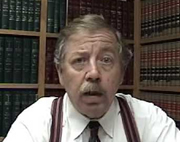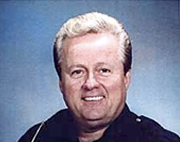What Makes a Law Valid?
by Brent Johnson
With thousands upon thousands of new statutes, regulations, ordinances and resolutions which are added to federal, state and local bodies of rules every week, it is impossible for any one Citizen, or even for any attorney, to possess a full knowledge of this endless stream of legislation each of us is expected to follow and obey. This creates an impossible problem for those who wish to obey the law, since nobody can be expected to know the full extent of all of these laws. Or does it?
In reality, it is easy for an American Citizen to understand the law which he or she is required to obey. All you need to know is how to differentiate between a valid public law (which you must obey) and an act of private "law" (which does not necessarily apply to you).
Public law is the general body of laws, enacted by the constitutional state Legislature or federal Congress, and which the general population is expected to obey. Federal public laws may be found in the United States Statutes at Large, while state public laws will be found in your state's General Laws or Sessions Laws. State Revised Statutes and the United States Codes are not public laws; they are bodies of copyrighted private law.
Private law is exactly what it sounds like: a body of rules and regulations which apply to a private, select group only. In order for a body of private law to apply to you, you must be a member of the organizational structure which issued the private law. In other words, if you are not a member of a corporation, then that corporation's rules and regulations (i.e. private law) do not apply to you.
For example, lets say that you are having a party. Everyone you care about is there, having a great time. There's lots of drinking, music, dancing, socializing, etc. Suddenly, the doorbell rings. Upon answering, you find a stranger on your doorstep. He enters your house and declares to all those attending the party that some rules are being instituted, and everybody is going to have to follow these rules or be subject to a fine.
What would you do in such a situation? Would you accept these edicts as having the force of law? Would you obey this "law" that some stranger tried to impose on you and your friends, in your private home? I suspect that most of you would simply ask the stranger to leave. Some of you might call the police and have the stranger removed from your property. But would any among you quietly accept this "law" that some stranger had declared to be in force at your private party?
This is a precise analogy to the current state of affairs in our country. All levels of government have been incorporated, placing township, county, parish, and state governments under the jurisdiction of the United States federal government. This is because all corporations get their existence from federal statutes, and are therefore bound to obey the rules established by their Creator, the federal government, itself a private corporation.
Corporate law is private law. It is not public law. As a matter of fact, try asking a judge; he will tell you that his court does not operate under public law, but under public policy. This is because all "official" courts operate under a body of private, corporate law.
If Magnavox Corporation establishes a "law" that requires all workers to start work at 7:00 AM, such a "law" does not apply to you if you do not work for Magnavox Corporation! It is "private law" and therefore only applies to those who volunteer into the jurisdiction of the lawgiver.
Corporate law in the form of statutes, ordinances, resolutions and regulations, does not have the force of public law. Such private law includes each corporate State's body of Revised Statutes, and the federal United States Codes. These are all bodies of private law! Look at the inside cover page of any volume of a Stet's Revised Statutes or the federal U.S. Codes, and you will find a copyright notice. Considering that you cannot copyright public property (such as a public law), this proves that these bodies of statutes are private, not public law. Therefore, you must volunteer into the jurisdiction of the lawgiver.
Who exactly is the lawgiver in this case? It is the corporate federal government. It is not the constitutional federal, state, county, parish, or township government.
Who must obey these private laws? Those people who are members of the government corporation.
How do you become a member of the government corporation? By obtaining a non-required federal Social Security taxpayer identification number (SSN).
When you applied for a SSN you entered into a contractual relationship with the federal government, to have their property (the SSN) attached to your body. Of course, this means that everywhere you go and everything you do directly affects federal property, so your actions and behavior must be tightly regulated and controlled.
However, if you give back your permission to have a SSN attached to your body then you simultaneously reclaim your God-given Natural Rights and cannot thereafter be compelled to pay the "fines" imposed by the corporate government for breaking its body of private rules and laws. This is the foundation for securing your freedom.
Enacting Clauses
How can you be expected to know which laws apply to you? The answer lies in a constitutionally mandated requirement for all valid laws: the enacting clause. The original enacting clause was, "I am the Lord thy God, who brought thee out from bondage in Egypt."
The purpose of the enacting clause is to identify the lawgiver, so that those who are under the jurisdiction of the lawgiver may know what is expected of them. In medieval England, you might have heard a town crier say something like this: "Oyez! Oyez! King Henry, Royal Proctor of the British Empire, Lord Regent of the Irish Republic, Lord High Baron and First Minister of the Welsh Peninsula, does hereby decree the following..." If you are a subject of King Henry then you know that what follows applies to you. If you are not one of King Henry's subjects then you know that this law does not apply to you.
In America, every state constitution but four (Pennsylvania, Delaware, Georgia, Virginia) and the federal Constitution, requires that an enacting clause be placed before each and every law in order for that law to be valid. Most state constitutions even list the precise wording for these enacting clauses. Further, with respect to the four states and the federal United States, their respective Supreme Courts have long ago and repeatedly adjudicated the enacting clause to be a requirement of a valid law.
Let's say you are arrested and charged for a violation of Oregon Revised Statutes 123.4. You go to a law library and look up ORS 123.4. You must find an enacting clause (e.g. The Legislature of the State of Oregon does hereby enact the following) right there, on the face of the statute you are charged with violating. You cannot be required to cross-reference to other bodies of law, including but not limited to, the General or Sessions laws of the state. The enacting clause must be on the face of the statute you are charged with violating. Its omission invalidates the law and thereafter nobody can be tried for, convicted or even accused of violating that statute.
Subject Matter Jurisdiction
The lack of an enacting clause raises a challenge to subject matter jurisdiction. This jurisdictional challenge may be made at any time, even if you have already pled guilty. A motion to dismiss for lack of subject matter jurisdiction may even be made after you have been duly convicted and imprisoned. A subject matter jurisdictional challenge must be heard, and no court may claim subject matter jurisdiction where it lacks it; to do so is an act of usurpation and represents the legal justification for an armed revolution.
A judge who denies a subject matter jurisdiction challenge based on a lack of an enacting clause when the facts presented show the lack of such a mandated clause, has committed a wanton act of usurpation and treason and has vacated his judicial immunity and legal authority, becoming nothing more than a common criminal. No judge may deny a Motion to Dismiss for lack of subject matter jurisdiction, if the challenge is based on the lack of an enacting clause in the charging document, because all revised statutes and federal U.S. Codes lack enacting clauses! In other words, all statutes currently on the books are invalid! You do not have to obey these pieces of private law, unless you wish to be a member of the government corporation, eligible to receive its benefits and privileges (instead of your God-given, Natural rights).
With the ongoing and ever increasing ocean of federally initiated pieces of legislation, it is incumbent on all freedom-loving, liberty-minded Americans to learn the difference between public law which they are expected to obey, and private law which need not apply to them. Once you understand the truth you will be more able to live the American dream free from government regulation.
With thousands upon thousands of new statutes, regulations, ordinances and resolutions which are added to federal, state and local bodies of rules every week, it is impossible for any one Citizen, or even for any attorney, to possess a full knowledge of this endless stream of legislation each of us is expected to follow and obey. This creates an impossible problem for those who wish to obey the law, since nobody can be expected to know the full extent of all of these laws. Or does it?
In reality, it is easy for an American Citizen to understand the law which he or she is required to obey. All you need to know is how to differentiate between a valid public law (which you must obey) and an act of private "law" (which does not necessarily apply to you).
Public law is the general body of laws, enacted by the constitutional state Legislature or federal Congress, and which the general population is expected to obey. Federal public laws may be found in the United States Statutes at Large, while state public laws will be found in your state's General Laws or Sessions Laws. State Revised Statutes and the United States Codes are not public laws; they are bodies of copyrighted private law.
Private law is exactly what it sounds like: a body of rules and regulations which apply to a private, select group only. In order for a body of private law to apply to you, you must be a member of the organizational structure which issued the private law. In other words, if you are not a member of a corporation, then that corporation's rules and regulations (i.e. private law) do not apply to you.
For example, lets say that you are having a party. Everyone you care about is there, having a great time. There's lots of drinking, music, dancing, socializing, etc. Suddenly, the doorbell rings. Upon answering, you find a stranger on your doorstep. He enters your house and declares to all those attending the party that some rules are being instituted, and everybody is going to have to follow these rules or be subject to a fine.
What would you do in such a situation? Would you accept these edicts as having the force of law? Would you obey this "law" that some stranger tried to impose on you and your friends, in your private home? I suspect that most of you would simply ask the stranger to leave. Some of you might call the police and have the stranger removed from your property. But would any among you quietly accept this "law" that some stranger had declared to be in force at your private party?
This is a precise analogy to the current state of affairs in our country. All levels of government have been incorporated, placing township, county, parish, and state governments under the jurisdiction of the United States federal government. This is because all corporations get their existence from federal statutes, and are therefore bound to obey the rules established by their Creator, the federal government, itself a private corporation.
Corporate law is private law. It is not public law. As a matter of fact, try asking a judge; he will tell you that his court does not operate under public law, but under public policy. This is because all "official" courts operate under a body of private, corporate law.
If Magnavox Corporation establishes a "law" that requires all workers to start work at 7:00 AM, such a "law" does not apply to you if you do not work for Magnavox Corporation! It is "private law" and therefore only applies to those who volunteer into the jurisdiction of the lawgiver.
Corporate law in the form of statutes, ordinances, resolutions and regulations, does not have the force of public law. Such private law includes each corporate State's body of Revised Statutes, and the federal United States Codes. These are all bodies of private law! Look at the inside cover page of any volume of a Stet's Revised Statutes or the federal U.S. Codes, and you will find a copyright notice. Considering that you cannot copyright public property (such as a public law), this proves that these bodies of statutes are private, not public law. Therefore, you must volunteer into the jurisdiction of the lawgiver.
Who exactly is the lawgiver in this case? It is the corporate federal government. It is not the constitutional federal, state, county, parish, or township government.
Who must obey these private laws? Those people who are members of the government corporation.
How do you become a member of the government corporation? By obtaining a non-required federal Social Security taxpayer identification number (SSN).
When you applied for a SSN you entered into a contractual relationship with the federal government, to have their property (the SSN) attached to your body. Of course, this means that everywhere you go and everything you do directly affects federal property, so your actions and behavior must be tightly regulated and controlled.
However, if you give back your permission to have a SSN attached to your body then you simultaneously reclaim your God-given Natural Rights and cannot thereafter be compelled to pay the "fines" imposed by the corporate government for breaking its body of private rules and laws. This is the foundation for securing your freedom.
Enacting Clauses
How can you be expected to know which laws apply to you? The answer lies in a constitutionally mandated requirement for all valid laws: the enacting clause. The original enacting clause was, "I am the Lord thy God, who brought thee out from bondage in Egypt."
The purpose of the enacting clause is to identify the lawgiver, so that those who are under the jurisdiction of the lawgiver may know what is expected of them. In medieval England, you might have heard a town crier say something like this: "Oyez! Oyez! King Henry, Royal Proctor of the British Empire, Lord Regent of the Irish Republic, Lord High Baron and First Minister of the Welsh Peninsula, does hereby decree the following..." If you are a subject of King Henry then you know that what follows applies to you. If you are not one of King Henry's subjects then you know that this law does not apply to you.
In America, every state constitution but four (Pennsylvania, Delaware, Georgia, Virginia) and the federal Constitution, requires that an enacting clause be placed before each and every law in order for that law to be valid. Most state constitutions even list the precise wording for these enacting clauses. Further, with respect to the four states and the federal United States, their respective Supreme Courts have long ago and repeatedly adjudicated the enacting clause to be a requirement of a valid law.
Let's say you are arrested and charged for a violation of Oregon Revised Statutes 123.4. You go to a law library and look up ORS 123.4. You must find an enacting clause (e.g. The Legislature of the State of Oregon does hereby enact the following) right there, on the face of the statute you are charged with violating. You cannot be required to cross-reference to other bodies of law, including but not limited to, the General or Sessions laws of the state. The enacting clause must be on the face of the statute you are charged with violating. Its omission invalidates the law and thereafter nobody can be tried for, convicted or even accused of violating that statute.
Subject Matter Jurisdiction
The lack of an enacting clause raises a challenge to subject matter jurisdiction. This jurisdictional challenge may be made at any time, even if you have already pled guilty. A motion to dismiss for lack of subject matter jurisdiction may even be made after you have been duly convicted and imprisoned. A subject matter jurisdictional challenge must be heard, and no court may claim subject matter jurisdiction where it lacks it; to do so is an act of usurpation and represents the legal justification for an armed revolution.
A judge who denies a subject matter jurisdiction challenge based on a lack of an enacting clause when the facts presented show the lack of such a mandated clause, has committed a wanton act of usurpation and treason and has vacated his judicial immunity and legal authority, becoming nothing more than a common criminal. No judge may deny a Motion to Dismiss for lack of subject matter jurisdiction, if the challenge is based on the lack of an enacting clause in the charging document, because all revised statutes and federal U.S. Codes lack enacting clauses! In other words, all statutes currently on the books are invalid! You do not have to obey these pieces of private law, unless you wish to be a member of the government corporation, eligible to receive its benefits and privileges (instead of your God-given, Natural rights).
With the ongoing and ever increasing ocean of federally initiated pieces of legislation, it is incumbent on all freedom-loving, liberty-minded Americans to learn the difference between public law which they are expected to obey, and private law which need not apply to them. Once you understand the truth you will be more able to live the American dream free from government regulation.




























































